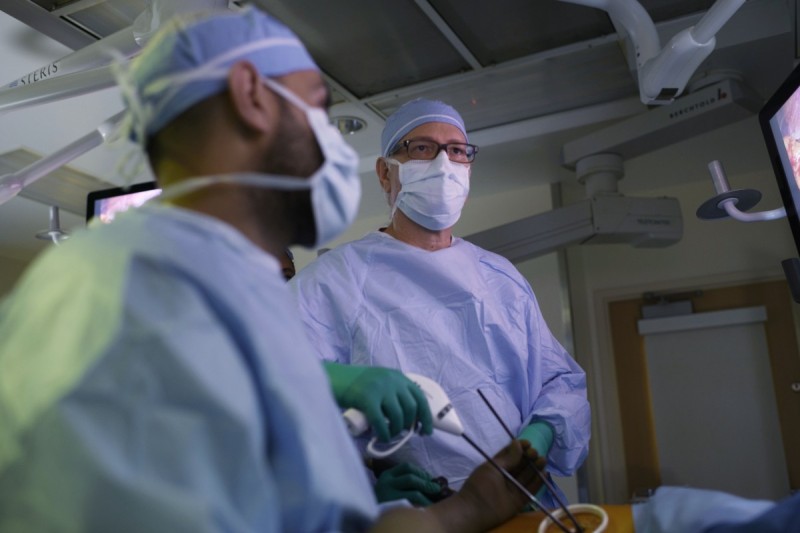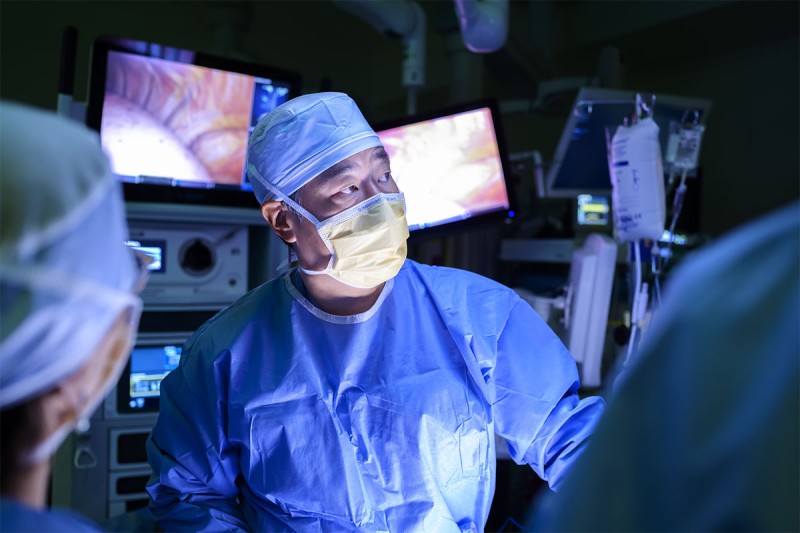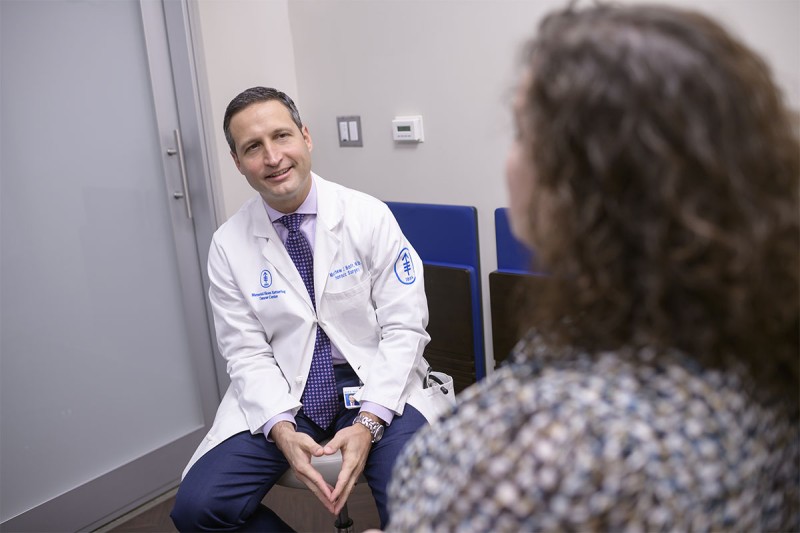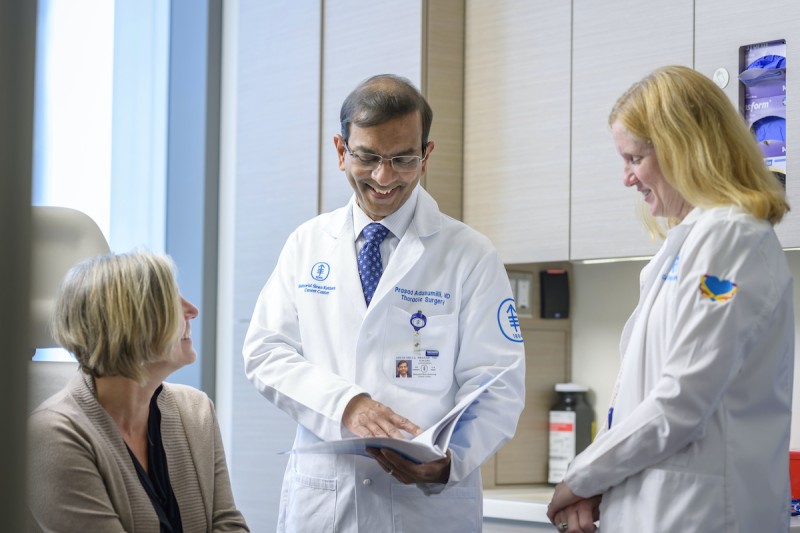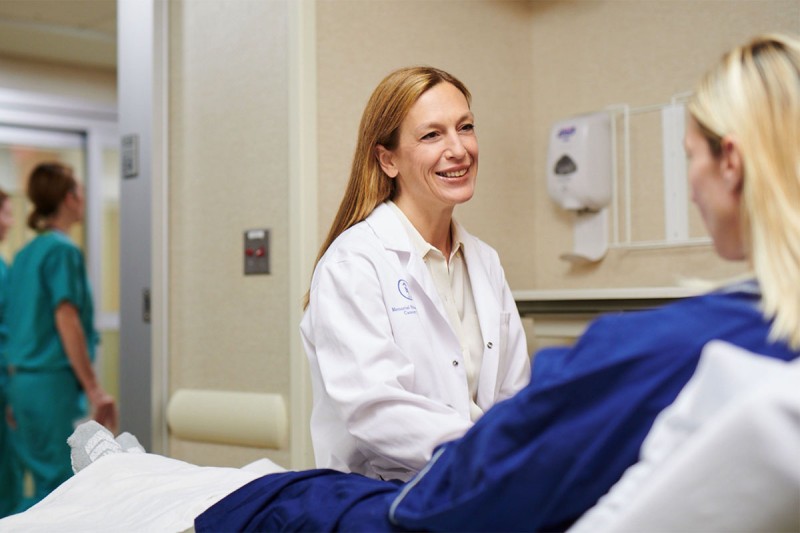The Thoracic Surgery Service at Memorial Sloan Kettering Cancer Center (MSK) provides comprehensive surgical care for patients with thoracic malignancies. Our thoracic surgeons are national and international leaders in treating patients with unusual, difficult to resect tumors and complex cancer cases. We also see a significant number of patients with thoracic cancers who have multiple medical conditions and are thought to be too high-risk for surgery at other less-experienced centers.
- We perform more than 2,600 operations and 6,000 procedures each year, including 1,200 lung cancer operations — among the busiest centers in the world.
- Each year, our team of thoracic surgeons provides more than 2,000 new patients with accurate and detailed pathological diagnoses, tumor molecular profiling, cancer staging, and personalized treatment plans.
- More than 75% of all lung cancer resections are performed using minimally invasive approaches, including more than 90% of resections on early-stage I and II cancers. Our minimally invasive methods allow surgery to be offered to people with medical conditions that make more traditional open procedures too risky.
- Our Thoracic Surgery Service collaborates with a fully integrated, multidisciplinary team of experts to treat each patient’s cancer — including surgeons, medical oncologists, pulmonologists, gastroenterologists, radiation oncologists, pathologists, and more.
- In addition to our internationally recognized lung cancer program, our other programs include:
Barrett’s esophagus is a condition in which the lining of the esophagus changes to protect itself from the pain caused by chronic reflux. Unfortunately, these changes increase the risk of esophageal cancer, which can be lethal if not promptly diagnosed. In response to the increasing need for early detection of Barrett’s esophagus and Barrett’s esophagus-associated dysplasia (the first changes suggestive of cancer risk), a comprehensive, multidisciplinary center for the diagnosis and treatment of Barrett’s esophagus and its complications has been developed at Memorial Sloan Kettering Cancer Center.
Our Barrett’s Esophagus Program provides state-of-the-art care from diagnosis to treatment, offering unmatched professional expertise and the latest endoscopic and surgical technology across the following services:
- Ablative technologies (radiofrequency, photodynamic, and cryotherapy)
- Endoscopic mucosal resection (EMR)
- Endoscopic submucosal dissection (ESD)
- Endoscopic ultrasound (EUS)
- Expert gastrointestinal pathology
- Gastrointestinal molecular assessment
- High-definition endoscopy with narrow band imaging (NBI)
- Manometry and 24-hour pH monitoring
For decades, Memorial Sloan Kettering Cancer Center has been recognized among the thoracic surgical oncology centers with the most remarkable outcomes in chest wall surgery worldwide. The Chest Wall Resection and Reconstruction Program (CWRRP), directed by Gaetano Rocco, MD, offers the best possible solutions to treat complex tumors that arise in the chest wall or involve the chest wall from other organs (i.e., the lung or breast). Patients with extensive tumor growths from the ribs and/or the sternum, as well as patients with infected chest wall tumors or those who already received radiation, can be evaluated for complex surgery, an intervention performed by a team of experienced specialists that provides the most technologically advanced standard of care. In addition to using innovative prosthetic materials and reconstructive strategies, our experts carefully evaluate the most appropriate and advanced medical treatments (i.e., chemotherapy and immunotherapy) capable of reducing tumor mass, thereby rendering surgery less extensive.
The CWRRP includes specialists from thoracic surgery, plastic surgery, and neurosurgery, as well as dedicated anesthesiologists who have not only performed hundreds of complex procedures in their careers but have also made significant contributions to our knowledge of these challenging tumors. Patients with chest wall tumors can reliably choose the CWRRP, where they will find our expertise and experience in the management of chest wall tumors rising to the highest possible standards of care.
The Esophageal Cancer Program focuses on each patient and their specific needs for the diagnosis, staging, and treatment of their disease to match outcomes with patient goals. Our disease management team includes renowned experts in the fields of surgery, medical oncology, radiation oncology, gastroenterology, pathology, radiology, and many other supportive services, all of which work together with patients and caregivers, taking a comprehensive approach to treating even the most challenging conditions. The program uses the latest surgical technology, molecular and genetic discoveries, and cutting-edge clinical trials to develop a personalized treatment plan for patients with:
- Benign esophageal tumors
- Complex gastrointestinal reconstruction
- Esophageal cancer
- Esophageal motility disorders
- Esophageal reflux
- Paraesophageal hernia
Lung nodules are a common finding and while some nodules found in the lung can be cancerous, others are benign. Therefore, biopsy is an important tool to differentiate the nodules that are cancerous from the nodules that are not. Lung biopsy is traditionally performed by inserting a needle through the skin into the underlying lung. Although this technique is highly accurate, it is occasionally associated with complications that can be quite frustrating for patients.
At Memorial Sloan Kettering Cancer Center (MSK), we have been working to establish new techniques for safe and effective lung biopsies. Through technological advances and our expertise, this has become a reality, and many of our lung biopsies can now be performed using a technique called robotic bronchoscopy. This procedure involves inserting a camera down the windpipe in patients who have received anesthesia. Using computer guidance, we can navigate to the nodule and perform biopsies from inside of the lung without puncturing the surface of the lung.
MSK is a national leader in this robotic bronchoscopy and has performed more than 1,000 robotic bronchoscopies with excellent results and extraordinary safety.1-3 We continue to lead innovation in this area, with the goal of providing detailed pathologic information which can be used to guide precision treatment and optimize care for patients with lung cancer.
- As leaders in thoracic surgery clinical care, we also provide excellent training and educational opportunities for the next generation of thoracic surgical oncologists.
- Our faculty also conduct cutting-edge research into the causes and biology of lung and esophageal cancer, many of which have led to clinical trials and new therapies.
- We created the genetic test MSK-IMPACT® to identify mutations in tumors for more personalized, targeted treatments. We use this tumor genomic profiling for all lung and esophageal cancers.
- Thoracic surgical consultations are available at several locations in New York and New Jersey, and via telemedicine. Importantly, we also offer telehealth and in-person consultations around the world.
1. Kalchiem-Dekel O, Connolly JG, Lin IH, Husta BC, Adusumilli PS, Beattie JA, Buonocore DJ, Dycoco J, Fuentes P, Jones DR, Lee RP, Park BJ, Rocco G, Chawla M, Bott MJ. Shape-Sensing Robotic-Assisted Bronchoscopy in the Diagnosis of Pulmonary Parenchymal Lesions. Chest. 2022 Feb;161(2):572-582. doi: 10.1016/j.chest.2021.07.2169. Epub 2021 Aug 9. PMID: 34384789; PMCID: PMC8941601.
2. McLoughlin KC, Bott MJ. Robotic Bronchoscopy for the Diagnosis of Pulmonary Lesions. Thorac Surg Clin. 2023 Feb;33(1):109-116. doi: 10.1016/j.thorsurg.2022.08.008. PMID: 36372527.
3. Kalchiem-Dekel O, Fuentes P, Bott MJ, Beattie JA, Lee RP, Chawla M, Husta BC. Multiplanar 3D fluoroscopy redefines tool-lesion relationship during robotic-assisted bronchoscopy. Respirology. 2021 Jan;26(1):120-123. doi: 10.1111/resp.13966. Epub 2020 Nov 2. PMID: 33140495.
4. Connolly JG, Kalchiem-Dekel O, Tan KS, Dycoco J, Chawla M, Rocco G, Park BJ, Lee RP, Beattie JA, Solomon SB, Ziv E, Adusumilli PS, Buonocore DJ, Husta BC, Jones DR, Baine MK, Bott MJ. Feasibility of shape-sensing robotic-assisted bronchoscopy for biomarker identification in patients with thoracic malignancies. J Thorac Cardiovasc Surg. 2022 Nov 25:S0022-5223(22)01258-2. doi: 10.1016/j.jtcvs.2022.10.059. Epub ahead of print. PMID: 36621452.
A Note from the Service Chief
The mission of the Thoracic Surgery Service at Memorial Sloan Kettering Cancer (MSK) center is to care for each patient with a laser focus on accurately diagnosing and then treating their cancer with curative intent. Our faculty are national and international experts in the surgical care of patients with lung, esophageal, and thymic tumors. Importantly, we also treat more uncommon and rare tumors that many other programs will never see or treat.
Our Thoracic Surgery Service performs more thoracic surgical oncology procedures than any other cancer center in the United States. These procedures are performed using state-of-the-art, minimally invasive approaches to minimize patient pain and discomfort and decrease time spent in the hospital. Importantly, our team treats some of the rarest tumors in thoracic oncology. These uncommon tumors may never be seen or treated by other programs.
Our surgeons work collaboratively with our dedicated medical and radiation oncologists to provide each patient a personalized treatment plan. Many of the treatment approaches were first identified and then introduced to the world by MSK’s surgeons and our multidisciplinary team. Examples include genomic profiling of each patient’s lung cancer to identify alterations that will respond to targeted therapies, the use of immunotherapy in patients with operable lung cancer, the use of chimeric antigen receptor (CAR) T cell therapy for malignant mesothelioma, the use of robotic surgery and video-assisted thoracic surgery (VATS) to remove lung cancer, and the early adoption of a completely minimally invasive approach to esophageal cancer surgery.
We are committed to providing the highest-quality thoracic surgical oncology care to each patient that is based on state-of-the-art science and technology. We also understand the importance of delivering this care in a compassionate and personalized manner to all patients. At MSK, we know that a cancer diagnosis is a life-changing event; however, we are committed to walking with each patient in their journey towards the ultimate goal of a cure and providing support at each step along the way.
Sincerely,
David R. Jones, MD
Chief, Thoracic Surgery Service
Druckenmiller Chair of Lung Cancer Research
Co-Director, Druckenmiller Center for Lung Cancer Research







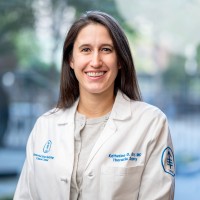







Active Clinical Trials
Esophageal Cancer Clinical Trials
Refer a Patient
Referring a patient to one of our thoracic surgeons is easy. Our Physician Access Service team, staffed by oncology referral specialists, is available to assist you with scheduling appointments for your patients, Monday to Friday, from to (Eastern time), at any of our convenient locations in New York City, New Jersey, Long Island, and Westchester.
Our thoracic surgeons can perform surgery on many people with locally advanced cancer who are not able to be treated elsewhere. This is also true for some people with metastatic cancer.
MSK surgeons frequently perform second and third surgeries on patients, using minimally invasive approaches when possible.
Referrals can be made by:
- Phone: 646-677-7440
- Online: Request an appointment here, and one of our specialists will contact you and your patient within 1 business day of receiving the completed form.
- Email: [email protected]
